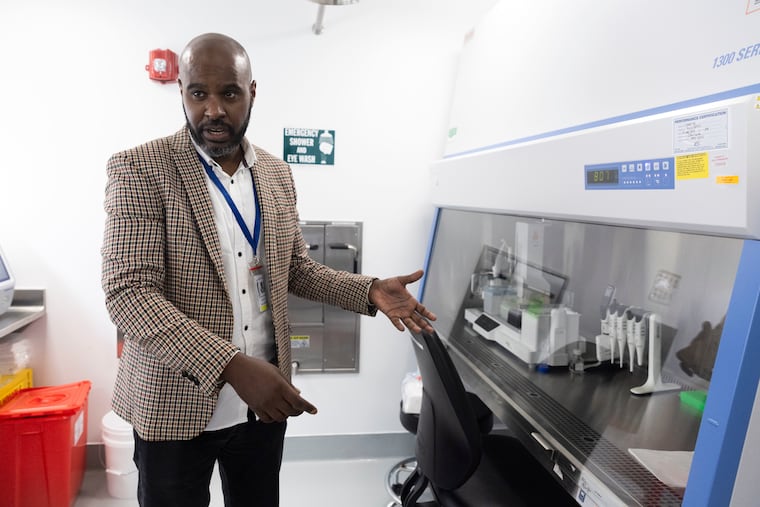Inside the lab where Philly health officials are testing for new COVID variants
The new lab, which opened in South Philadelphia’s Constitution Health Plaza in October, is a marked improvement from the city’s previous facilities.

Inside the Philadelphia health department’s new lab in South Philadelphia, machines that test for everything from COVID-19 to HIV to the flu are in a constant whir. Red blood cells are counted in samples from patients at the city’s public health clinics. Wild animals are tested for rabies — and even bologna sandwiches handed out at children’s summer camps are checked for pathogens.
And this public health work is no longer at risk of being derailed by water leaking from the ceiling, or the power going out.
The new lab, the Philadelphia Department of Public Health’s Public Health Laboratory, which opened in October in South Philadelphia’s Constitution Health Plaza, is a marked improvement from the city’s previous facilities, which dated to the 1950s and whose services were often interrupted by power outages, computer network issues, and other building problems, said Bernadette Matthis, the lab’s director.
In their updated facilities, lab staff are now focusing on offering a broader array of public health testing services, including the long-sought-after ability to test wastewater for the presence of multiple COVID variants.
“People don’t often realize that we’re doing this work,” Matthis said. “Now we’re able to do it in a safer facility — and one that supports the testing.”
The scoop on Philly’s poop
The city’s wastewater has become a critical tool for city health officials to learn about the latest COVID variants still spreading, four years after the onset of the pandemic.
Wastewater sampling, in increasing use around the country, tends to give a more accurate picture of the extent to which COVID is circulating in a community because many people are now testing themselves for COVID at home with rapid tests that aren’t necessarily reported to health departments.
Since the public health emergency over COVID ended in spring 2023, the city is now reporting only the number of deaths and hospitalizations due to the virus — as well as the concentration of COVID in wastewater samples taken twice a week from three wastewater plants, in South Philadelphia, Southwest Philadelphia, and Port Richmond.
Wastewater from tens of thousands of households cycles through the plants, so the city can detect multiple variants in a single sample, unlike in an individual nasal swab.
Wastewater sequencing, or identifying the specific variants of COVID circulating in the wastewater, began several weeks ago. The department has so far identified several newer strains circulating in Philadelphia, including the JN.1, KP.2, KP.3 and LB.1 variants, all mutations of the Omicron variant that caused COVID surges in late 2021.
The most recent testing, as of July 1, saw an uptick in COVID concentrations in wastewater at the Port Richmond plant. Hospital admissions and reported deaths have remained low. Outside the city, several wastewater testing sites around the state have also detected increases in COVID concentrations.
That testing is made easier in the new lab, where new equipment, such as negative air pressure rooms that prevent the spread of pathogens and machines that sterilize equipment to kill microbes, make the job safer, Matthis said.
Still, the process is complex. “Wastewater itself is a very complicated media to work with — there’s just a lot of different stuff that goes into it, and that interrupts the process of sequencing. It’s really hard to get really good, clean data,” said Christopher Gu, a bioinformatician at the lab. “It’s our job to figure out how to parse the data and make sure it’s reliable enough to give to the public.”
Another challenge: staffing levels at the lab, which, like many other city departments, has several unfilled positions. Matthis estimates that the facility has about a 35% vacancy rate.
The department is hoping to offer more internships, work with a recruiting agency, and possibly increase salaries to fill the hiring gap, she said.
In the meantime, the lab is planning to increase its capacity to test wastewater for more diseases. By the fall, staff expect to be able to detect influenza A and B and RSV, and are looking to begin testing for mpox and H5N1, or avian flu.
“In anticipation of the flu season, we want to get that up and running,” Matthis said.